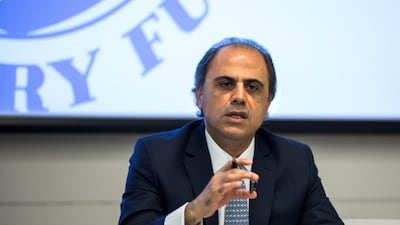Iraq's oil production and oil fields have not suffered any effect from the nationwide protests, according to the International Monetary Fund.
Opec's second-biggest member has been gripped by upheaval in recent weeks, as people protested against economic hardship, poor public services, unemployment and corruption.
"We are concerned with the violence and loss of life, we are closely watching and so far there is no impact on oil production or fields. With the presence of ample reserves, it's not yet expected that this could have an impact at the moment on oil price," Jihad Azour, director of the IMF's Middle East and Central Asia Department, said at a press conference in Dubai on Monday.
Despite the country's vast oil wealth, many Iraqis are living in poverty or with limited access to basic provisions, as the nation struggles to recover from years of conflict. Rounds of live bullets, tear gas and other violence has left more than 200 dead since the demonstrations began in early October.
The IMF said oil prices are "decoupling" from regional geopolitical tensions, with incidents in the region leading to a short-lived spike in oil prices. The muted reaction of oil prices to political risk is because of increased supply from US shale oil production as well as a global economic slowdown dampening demand.
Iraq's economy is expected to expand 3.4 per cent in 2019, from a 0.6 per cent contraction in 2018, on higher public spending and a "modest" increase in oil production, the IMF said in its Regional Economic Output report.
"The economy needs to create more jobs and the impact of recent security developments requires more spending on rebuilding infrastructure," Mr Azour said in an interview.
Across the border, Iran's economy is forecast to shrink 9.5 per cent in 2019, from a contraction of 4.8 per cent last year, due to the impact of US sanctions, the IMF said.
In 2020, economic growth in Iran will be flat and the IMF urged authorities to act quickly to address the impact by realigning the exchange rate with the market rate, reforming the banking system and creating a safety net for low-income people to alleviate the impact of inflation, Mr Azour said. Inflation rates will reach around 35 per cent in 2019 and hover around 30 per cent next year.













